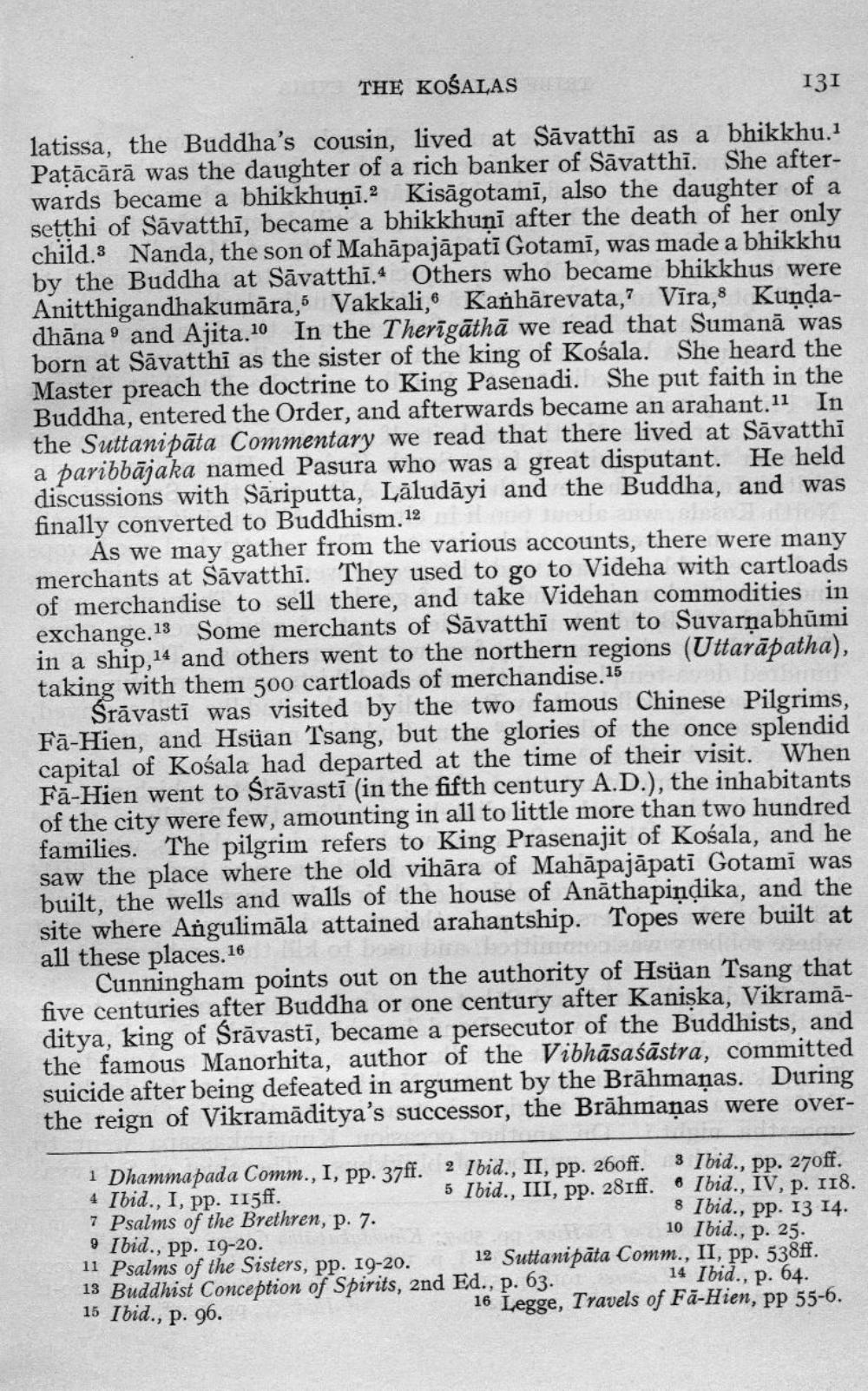________________
THE KOSALAS
latissa, the Buddha's cousin, lived at Savatthi as a bhikkhu.1 Paṭācārā was the daughter of a rich banker of Savatthi. She afterwards became a bhikkhuni. Kisāgotami, also the daughter of a seṭṭhi of Savatthi, became a bhikkhuni after the death of her only child. Nanda, the son of Mahapajapati Gotami, was made a bhikkhu by the Buddha at Savatthi. Others who became bhikkhus were KundaAnitthigandhakumāra, Vakkali," Kanhärevata, Vīra,8 dhana and Ajita.10 In the Therīgatha we read that Sumană was born at Savatthi as the sister of the king of Kośala. She heard the Master preach the doctrine to King Pasenadi. She put faith in the Buddha, entered the Order, and afterwards became an arahant.11 the Suttanipata Commentary we read that there lived at Savatthi a paribbājaka named Pasura who was a great disputant. He held discussions with Sariputta, Laludayi and the Buddha, and was finally converted to Buddhism.12
In
PHOTO
As we may gather from the various accounts, there were many merchants at Savatthi. They used to go to Videha with cartloads of merchandise to sell there, and take Videhan commodities in exchange. 13 Some merchants of Savatthi went to Suvarnabhumi in a ship,14 and others went to the northern regions (Uttarapatha), taking with them 500 cartloads of merchandise. 15
Śravasti was visited by the two famous Chinese Pilgrims, Fa-Hien, and Hsüan Tsang, but the glories of the once splendid capital of Kośala had departed at the time of their visit. When Fa-Hien went to Sravasti (in the fifth century A.D.), the inhabitants of the city were few, amounting in all to little more than two hundred families. The pilgrim refers to King Prasenajit of Kośala, and he saw the place where the old vihara of Mahāpajapati Gotami was built, the wells and walls of the house of Anathapindika, and the site where Angulimāla attained arahantship. Topes were built at all these places.16
131
Cunningham points out on the authority of Hsüan Tsang that five centuries after Buddha or one century after Kaniska, Vikramāditya, king of Śrāvasti, became a persecutor of the Buddhists, and the famous Manorhita, author of the Vibhasaśāstra, committed suicide after being defeated in argument by the Brahmanas. During the reign of Vikramaditya's successor, the Brāhmaṇas were over
3 Ibid., pp. 270ff. 6 Ibid., IV, p. 118. 8 Ibid., pp. 13 14. 10 Ibid., p. 25.
12 Suttanipata Comm., II, pp. 538ff. 14 Ibid., p. 64. 16 Legge, Travels of Fa-Hien, pp 55-6.
2 Ibid., II, pp. 260ff. 5 Ibid., III, pp. 281ff.
1 Dhammapada Comm., I, pp. 37ff. 4 Ibid., I, pp. 115ff.
7 Psalms of the Brethren, p. 7.
9 Ibid., pp. 19-20.
11 Psalms of the Sisters, pp. 19-20.
13 Buddhist Conception of Spirits, 2nd Ed., p. 63. 15 Ibid., p. 96.




